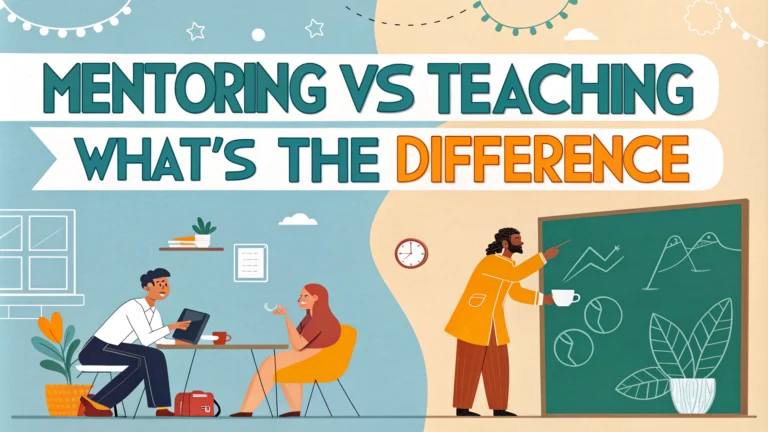The distinct roles of teachers and mentors shape how knowledge and skills are passed on to others. While both positions focus on growth and development, their approaches and relationships with learners differ significantly.
Teachers typically work within structured environments following specific curricula, while mentors build personal connections and provide individualized guidance based on real-world experience.
Key Differences Between Teaching and Mentoring
- Relationship Dynamic: Teachers maintain professional boundaries with students, mentors develop closer, more personal connections
- Time Frame: Teaching follows fixed schedules, mentoring relationships are often long-term and flexible
- Focus Area: Teachers cover specific subjects, mentors address career and personal development
- Assessment: Teaching includes formal evaluations, mentoring relies on informal feedback and growth indicators
Essential Skills for Effective Teaching
- Subject Expertise: Deep knowledge of specific content areas
- Classroom Management: Ability to handle multiple students and maintain order
- Assessment Skills: Evaluating student progress through tests and assignments
- Lesson Planning: Creating structured learning experiences
“Teaching is about imparting knowledge, while mentoring is about sharing wisdom.”
Core Components of Mentoring
- Active Listening: Understanding mentee challenges and goals
- Experience Sharing: Providing real-world insights and lessons learned
- Network Building: Connecting mentees with valuable contacts
- Career Guidance: Offering strategic professional development advice
| Teaching | Mentoring |
|---|---|
| Structured curriculum | Flexible guidance |
| Formal assessment | Informal feedback |
| Group focus | Individual attention |
Combining Teaching and Mentoring Approaches
Blending teaching and mentoring skills creates powerful learning experiences. Strategic combinations help develop well-rounded students and professionals.
- Classroom Mentoring: Incorporate real-world examples into lessons
- Group Mentorship: Apply teaching techniques to guide multiple mentees
- Skills Transfer: Use teaching methods to structure mentoring sessions
Selecting Your Educational Role
Consider your strengths and preferred working style when choosing between teaching and mentoring positions.
| Consider This | Teaching Fits If You | Mentoring Fits If You |
|---|---|---|
| Work Style | Prefer structure | Value flexibility |
| Communication | Excel in groups | Connect one-on-one |
| Time Investment | Want set hours | Can be available as needed |
Effective Practices for Both Roles
- Clear Communication: Set expectations early
- Regular Check-ins: Monitor progress and adjust approaches
- Goal Setting: Create achievable milestones
- Feedback Systems: Establish two-way communication channels
“The best educators know when to teach and when to mentor – sometimes within the same session.”
Building Your Educational Impact
Success in teaching or mentoring requires ongoing development and adaptation. Focus on building relationships while maintaining professional standards.
Action Steps:
- Identify your preferred educational role
- Develop core skills for your chosen path
- Create a personal development plan
- Build a support network of fellow educators
Track your progress and adjust methods based on learner feedback. Stay current with educational trends and professional development opportunities.
Frequently Asked Questions About Mentoring vs Teaching
General FAQs
Q: What is the main difference between mentoring and teaching?
A: Teaching focuses on delivering specific curriculum and knowledge in a structured setting, while mentoring involves a more personal, long-term relationship focused on overall development and guidance.
Q: Can someone be both a mentor and teacher?
A: Yes, many professionals serve both roles. Teachers can mentor students beyond classroom hours, while mentors often include teaching elements in their guidance.
Q: Which is more formal – mentoring or teaching?
A: Teaching typically follows a more formal structure with set curricula and assessment methods. Mentoring is generally more informal and flexible.
Long-tail Keyword FAQs
Q: What are the success rates of workplace mentoring vs traditional training?
A: Research shows workplace mentoring has a 70% retention rate for learning compared to 50% for traditional training methods.
Q: How much does professional mentoring cost compared to teaching courses?
A: Professional mentoring typically ranges from $100-500 per session, while teaching courses average $50-200 per hour. Costs vary by:
- Industry expertise
- Location
- Duration
- Group vs individual format
Q: What qualifications do you need for mentoring vs teaching?
A: Teaching requires formal qualifications:
- Teaching degree
- State certification
- Continuing education credits
Mentoring typically requires:
- Industry experience
- Relevant expertise
- Strong communication skills
Q: How long should mentoring relationships last vs teaching periods?
A: Teaching follows fixed terms (semester/year), while mentoring relationships typically last 6 months to several years.
Q: What are the best online platforms for mentoring vs teaching?
A: Popular platforms include:
| Mentoring | Teaching |
|---|---|
| MentorCruise | Udemy |
| PushFar | Coursera |
| LinkedIn Mentoring | Khan Academy |
Q: Do mentors get paid more than teachers?
A: Professional mentors typically earn $50-200/hour while teachers average $25-50/hour. However, teaching offers more stable employment and benefits.
Q: What’s the ROI of corporate mentoring vs corporate training?
A: Corporate mentoring shows 500% ROI on average, while traditional corporate training averages 100% ROI when measuring employee retention and performance improvements.
Q: How many students can one person effectively mentor vs teach?
A: Teachers can effectively manage 20-30 students per class, while mentors typically work best with 1-5 mentees at a time for optimal results.



















